Atlas VPN Review 2025
Atlas VPN is another good offering from Nord Security, but is there any reason to choose it over its more famous siblings Surfshark and NordVPN? In my Atlas VPN review, I’ll see if this provider can hold up your online world or if it drops the ball.
- Table of Contents
- FAQ
- Atlas VPN Review Overview
- Atlas VPN: Latest News & Updates
- Atlas VPN Background & History
- What Is Atlas VPN?
- Atlas VPN Features
- Atlas VPN Cost: Plans & Value for Money
- Apps & Support
- Servers & Server Locations
- Speeds & Performance Testing
- Streaming & Torrenting
- Atlas VPN Security: Encryption & Protocols
- Privacy & Logs
- Customer Support & Service
- Ease of Use
- Bottom Line: Do I Recommend Atlas VPN?
- Atlas VPN Alternatives
Quick Summary: Atlas VPN Review
You can use Atlas VPN free with 5GB of data per month, and it comes with unlimited simultaneous connections. I also like its speeds, but other than that, this VPN left me wanting more. Still, you can try it yourself for free or with a 30-day money-back guarantee.
Among the three VPN providers owned by Nord Security, Atlas VPN has a bit of a “plus the other guy” energy. While Surfshark and NordVPN are pushing boundaries with innovations like Nexus and Meshnet, Atlas VPN is just kind of…there. I set out to write a full Atlas VPN review so I could see if there was more to the story.
What I found was a VPN service with a lot to like, but very little setting it above its direct rivals, both of which rank high on my best VPN list. Atlas VPN has a decent free plan, pretty good speeds and a mostly great record of unblocking streaming services. Its special features — including a data breach monitor and malware blocker — do what they’re supposed to. Beginners will find a user-friendly app.
It’s all adequate, but Atlas VPN is constantly mentioned in the same breath as NordVPN and Surfshark. However, it needs to be exceptional to stand out, and it doesn’t quite make that grade. There are too many flaws, from the lack of router support to the shaky privacy policy. But an overview doesn’t do it justice — let’s get into the specifics.
- Money-Back Guarantee30 daysWorldwide Server Amount42 countries
FAQ
Is Atlas VPN Trustworthy?
You can definitely trust Atlas VPN to protect you from outside interference with your web traffic. However, its no-logs policy could use more corroborating evidence. If you’re in serious need of privacy, I’d recommend Proton VPN, VyprVPN or Mullvad instead.Which Is Better: NordVPN or Atlas VPN?
NordVPN is the better product in just about every area. It has more servers, more locations, faster speeds, more interesting features and a better privacy record. Atlas VPN only has it beat on pricing, offering a free plan when NordVPN has only a free trial.Is Atlas VPN Owned by NordVPN?
Atlas VPN is one of three VPNs owned by Nord Security, the same company that owns NordVPN and Surfshark.Does Netflix Block Atlas VPN?
Atlas VPN is able to unblock Netflix in every country I tested. It’s impossible to test every server, but what I saw left me confident that Netflix can’t block Atlas VPN.
Atlas VPN Review Overview
I tested Atlas VPN’s speed and latency, its security and its ability to unblock streaming platforms. I also checked out its features, its customer support, the size of its server network, its privacy policy and more. You’ll find my full results below.
- Free trialNoMoney-Back Guarantee30 daysWorldwide Server Amount42 countriesSimultaneous Connections999999Works withStreaming Access
- Pros
- Unlimited simultaneous connections
- Unblocks almost all streaming services
- Consistent international download speeds
- Low overall latency
- Affordable subscriptions
- 5GB monthly free plan
- Passed multiple security audits
Cons- Limited server network
- Couldn’t unblock Disney Plus
- Live chat only for paid users
- Large latency jumps on nearby servers
- Hidden fees for full service
- No browser extensions or router support
- No third-party privacy audit
How Good Is Atlas VPN?
Atlas VPN is a perfectly good service, and one of the only free VPNs to offer unlimited simultaneous connections. It’s a good VPN for multiple devices, but it also lacks some features that really shouldn’t be optional — like universal live chat, audits for its privacy policy, browser extensions and router support.
Atlas VPN: Latest News & Updates
The most recent major update to Atlas VPN came in August 2023, when it added a few small quality-of-life features, like server-down notifications and international payment methods. If there are any changes in the future, I’ll add an update to this section.
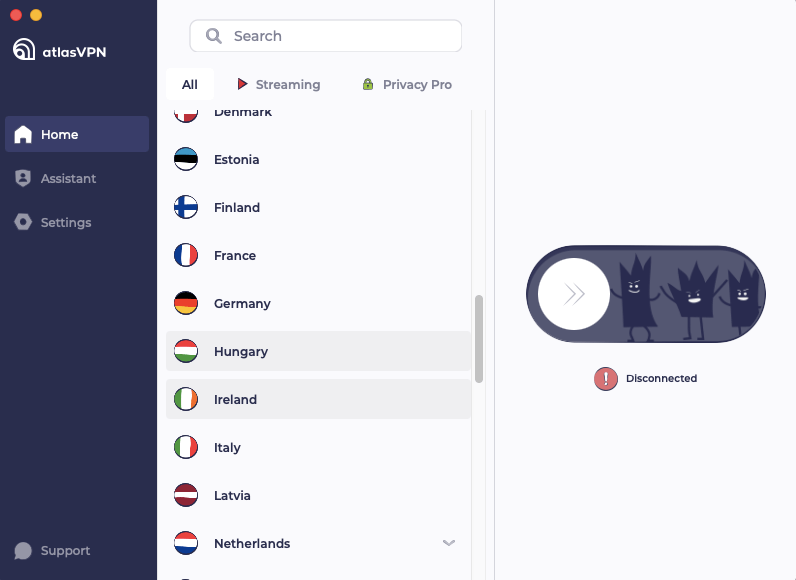
Atlas VPN Background & History
Founded in 2019, Atlas VPN was built from the beginning as a freemium VPN, with a free service funded by paid upgrade plans. It’s not on our best free VPN list yet, but has a good chance of making it there someday.
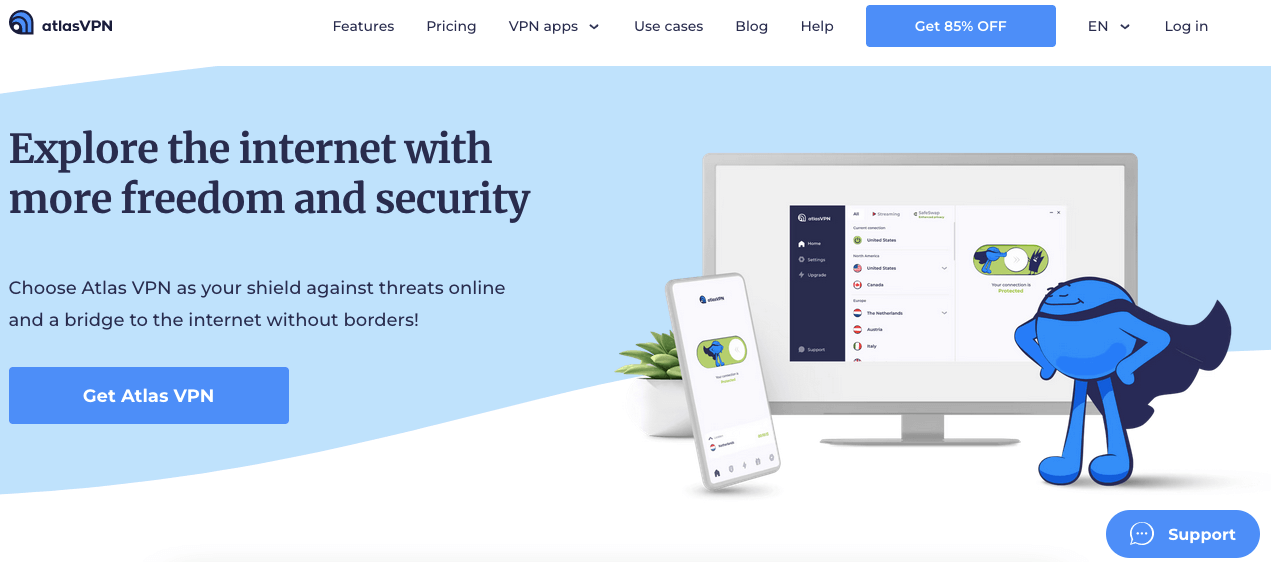
In 2021, Atlas VPN was acquired by Nord Security, though it continues to operate as an independent brand. It claims to have about 6 million users worldwide.
What Is Atlas VPN?
Atlas VPN is a virtual private network you can use to protect your online anonymity, change your IP address and use unsecured WiFi networks safely. All you have to do is connect to a VPN server through the Atlas VPN client app before you open your web browser. See my articles on what is a VPN and why use a VPN for more information.
Who Owns Atlas VPN?
Atlas VPN is owned by Nord Security, the same company that owns NordVPN and Surfshark. Nord Security began consolidating VPNs by acquiring Atlas VPN in 2021 and merging with Surfshark in 2022. It’s not the worst offender in the slow monopolization of the VPN industry, but it’s still a threat.
Where Is Atlas VPN Located?
Atlas VPN is based in Delaware, United States. The U.S. is part of the Five Eyes intelligence-sharing alliance, which it’s used as a loophole to spy on citizens. However, as long as Atlas VPN keeps to its privacy policy, there shouldn’t be any intelligence to share. The U.S. has no laws banning VPN usage or requiring VPN providers to keep logs.
Is Atlas VPN Safe?
Although Atlas VPN has never been caught keeping logs or handing over user information, its security record is shakier. In September 2023, a researcher discovered a flaw in the Linux app that leaked IP addresses. Atlas VPN took about two weeks to patch the zero-day weakness.
The problem only affected Linux users, and there’s no evidence anybody took advantage of it. However, if it’s true that Atlas refused to listen to the researcher until they posted the exploit publicly, the incident reveals a concerningly lax attitude to security.
How Has Atlas VPN Changed Over Time?
Atlas VPN’s blog publishes quarterly updates that track its evolution. In the most recent update, covering the second quarter of 2023, Atlas redesigned its user interface, added notifications about servers down for maintenance, added auto-connect on its smart TV apps and introduced a few new payment methods.
Atlas VPN Features
Atlas VPN is more rich in features than you might expect from a first glance. You won’t find anything envelope-pushing — like Surfshark Nexus (read my Surfshark review to learn about that) — but there’s enough to provide good value for your Atlas VPN subscription fee.
Basic Features
Atlas VPN includes four types of servers. The basic ones provide a simple VPN connection and encryption, with all the associated benefits for internet connection privacy. Streaming servers are configured to reduce lags and buffering (though without detail about how this actually works).
More interesting are the two types of “Privacy Pro” servers, called SafeSwap and MultiHop Plus. SafeSwap regularly rotates your IP address to make you harder to track. MultiHop Plus runs you through several of Atlas VPN’s servers and picks a random exit node, a lot like Tor Browser. It’s more secure than traditional double-hop VPNs, but there are only two locations.
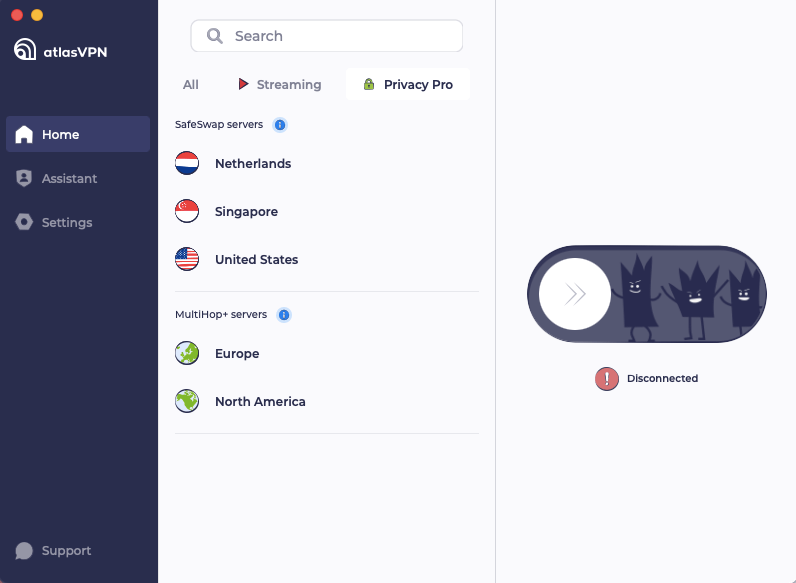
Exploring the Control Panels
The rest of the features are found in the “assistant” and “settings” control panels. Under the “security” tab on “settings,” you can activate the kill switch, which prevents you from getting online if your VPN connection drops. Atlas only has a “hard” kill switch — if it’s turned on, you cannot access the internet without connecting to a VPN server first.
The “app settings” tab is a grab-bag of miscellaneous features. You can choose a language for the VPN client, toggle where the app shows up on your account, switch between light and dark mode, and choose whether to send anonymized analytics. The blue “reset settings” button can restart your network if you’re having trouble connecting.
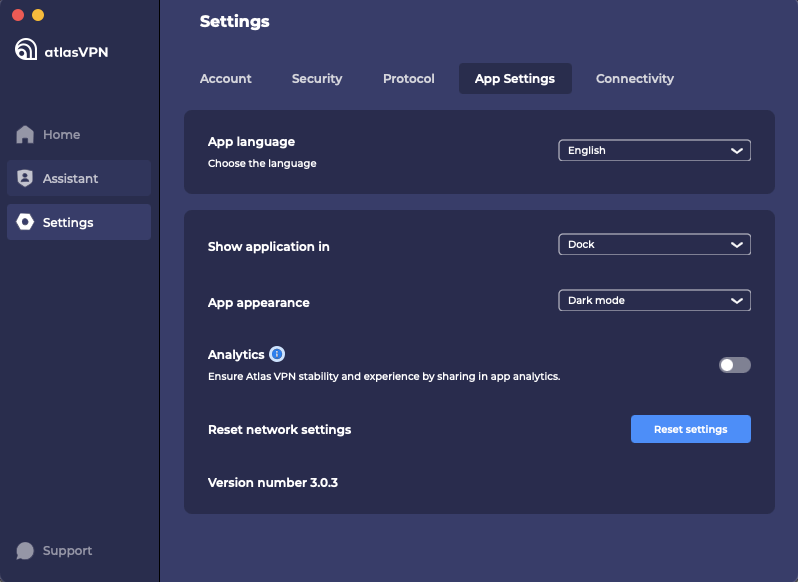
Finally, the “connectivity” tab lets you choose between several options for what the large connect button on the home screen will do. It can connect to the fastest location, the nearest location, a specific country or the best server in a category. Auto-connect makes this happen automatically when the VPN app starts up. It’s nice, but you can read about more robust automation in my CyberGhost review.
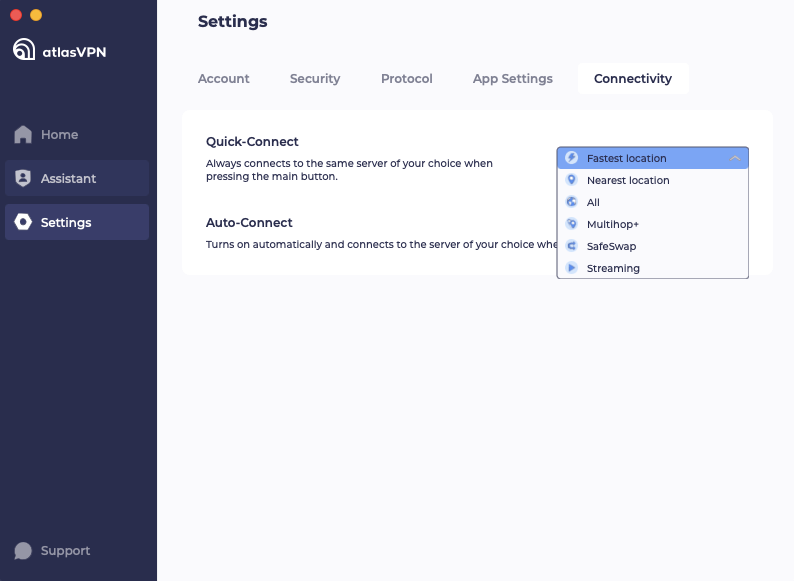
That’s all for basic features — everything else can be found on the “assistant” panel. All the features up to this point are available on every plan (free and paid). For the advanced features below, you’ll have to upgrade and pay an additional fee on top of your subscription.
Advanced Features
Atlas VPN’s two advanced features are SafeBrowse and the Data Breach Monitor. Neither of them are especially complex, but they’re premium add-ons that fall outside the purview of basic VPN protection.
SafeBrowse is an all-purpose blocker. It keeps third-party trackers from following you between sites and warns you whenever you’re about to load a site associated with malware or phishing. Remember that a blocker can only warn you about malicious sites — you’ll still need your wits about you to ward off phishing attempts and other social engineering attacks.
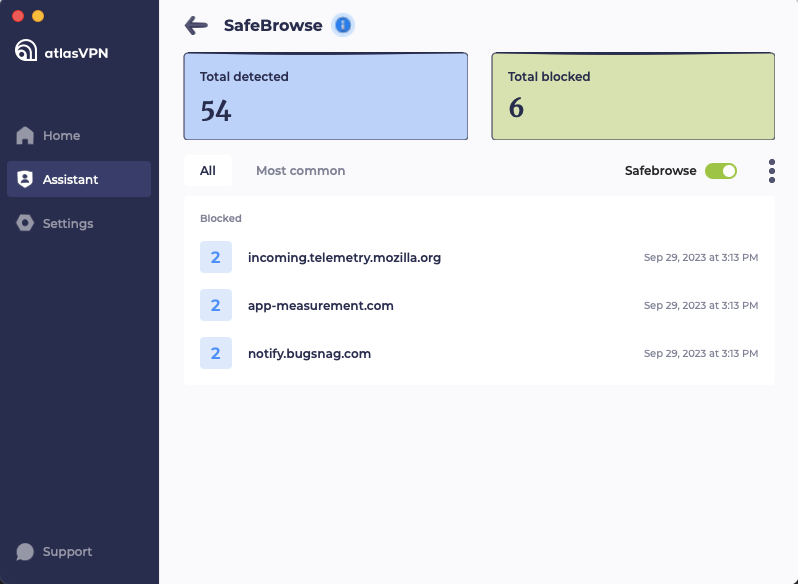
The other feature, Data Breach Monitor, scans the internet to see if any of your email addresses have appeared in data leaks. If you ever get an alert that an address has been compromised, you can change your login on any account associated with it.
What Is Atlas VPN Split Tunneling?
Atlas VPN does have split tunneling, but it’s only available for Android so far (though Windows app support is supposedly on the way). This feature lets you split your internet traffic, sending some through a VPN server and leaving some unprotected for better speeds. It can help you access websites that may be suspicious of a VPN, like online banking and local streaming platforms.
Atlas VPN Cost: Plans & Value for Money
Atlas VPN is easily the cheapest service in the Nord Security family, especially at the monthly level. In fact, it’s one of the cheapest anywhere, even once you’ve gotten past the initial billing period and started paying the higher renewal prices. There are a few hidden fees, though, so let’s break down how the pricing actually works.
Breaking Down Atlas VPN Pricing & Plans
Atlas VPN offers three subscription lengths for initial signups. Each comes with the same features, so the only difference is how much you pay per month.
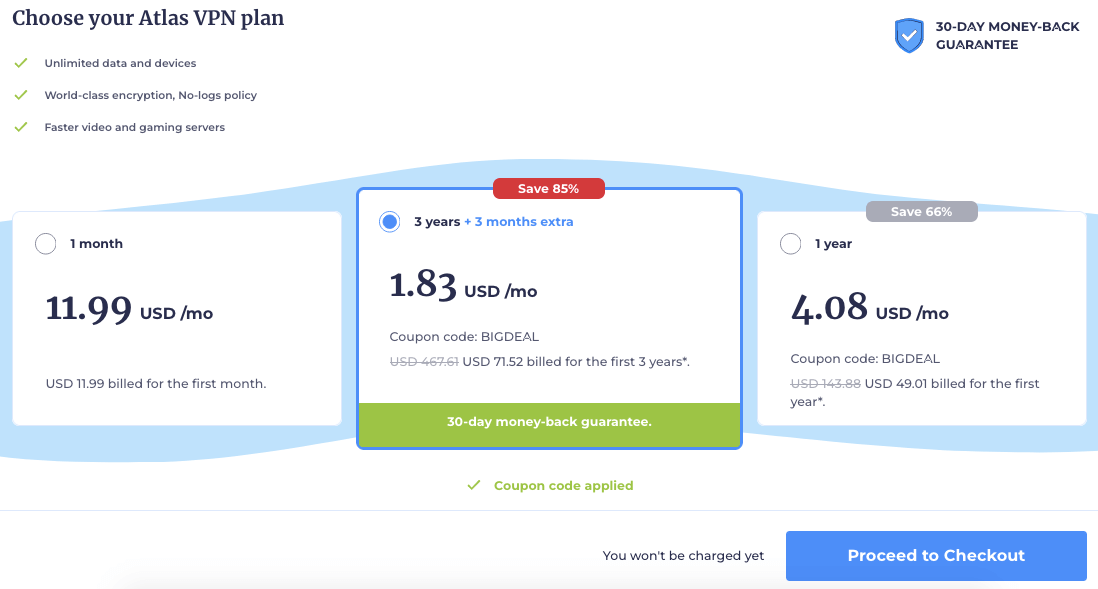
The cost of $11.99 per month makes Atlas VPN a good choice if you only need a VPN for a short time (such as for one trip out of the country). On a per-month basis, though, it’s not as good as Windscribe — see my Windscribe review to learn why. One year for $4.08 a month is even better, and 39 months for $1.83 each is exceptional. Keep an eye out for season discounts, too.
The hidden fees start as you check out. To get the full features, including Shield (malware and ad blocker) and the Data Breach Monitor, you’ll need to pay extra — $4.99 on the monthly plan, $0.89 per month on the yearly plan and $0.49 per month on the three-year plan.
Then there are the renewal prices. After your first one-year or three-year billing period, you will only be able to renew for a maximum of one year, which costs $59 ($4.92 per month). That’s a fairly serious jump, and it’s extremely hard to notice until after you subscribe and download Atlas VPN. I don’t consider these fees a dealbreaker, but you should factor them in.
How to Get Atlas VPN for Free
Atlas VPN includes a limited free plan with four server locations (New York, Los Angeles, Singapore and Amsterdam). It’s one of the only free VPNs to allow unlimited simultaneous connections, making it a worthy rival for the services on our best VPN for multiple devices list. On the other hand, its 5GB data limit on monthly traffic is more restrictive than most.
To download the free VPN, go to atlasvpn.com/free-vpn and click “download.” If you’d rather use it without the data limits, all plans come with a 30-day money-back guarantee (except the monthly plan, which has a 14-day guarantee). Contact the support team for a refund. If you’d prefer a free VPN that doesn’t cap your monthly data usage, head over to my Proton VPN review.
Atlas VPN Pricing Deals
At the time of writing, Atlas VPN automatically applies a coupon that adds three months to the three-year plan. If this ever ends, or if any better deals pop up, I’ll update this section.
Atlas also offers a Black Friday deal (for 2023, use the coupon code BLACKFRIDAY23). This code gets you six bonus months on the three-year plan instead of the usual three — that’s $1.70 per month ($71.52 total) for 42 months. The renewal price appears to be the same.
Apps & Support
Atlas VPN can’t be installed on as many different platforms as some of its competitors. It has no browser extensions, it’s not supported on routers and it only works on two types of smart TVs. Without routers, you can’t protect other smart TVs, game consoles or mobile devices that don’t run iOS or Android.
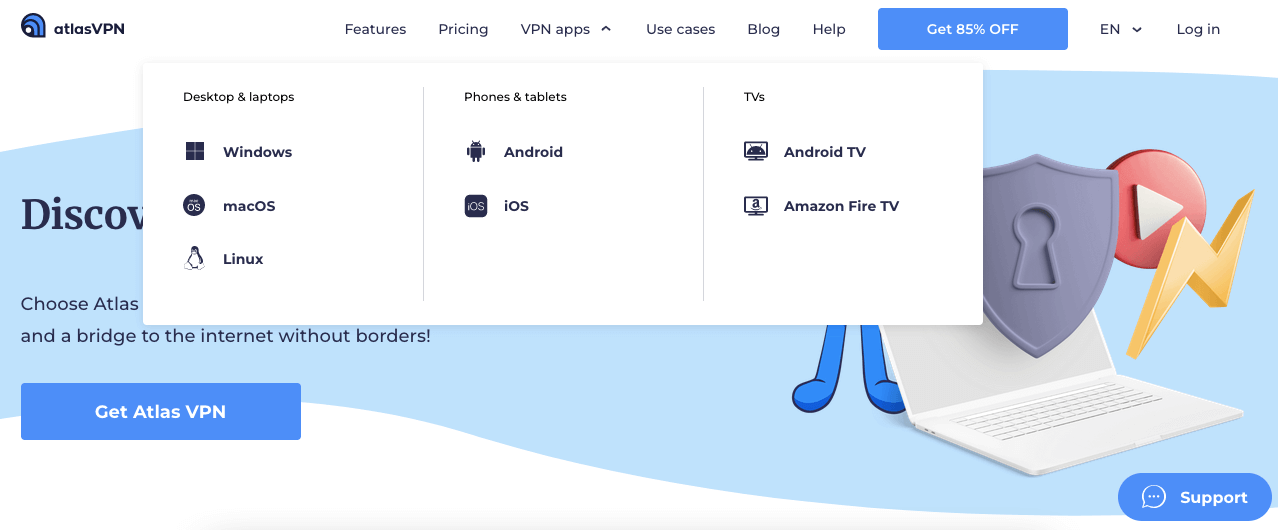
Infinite simultaneous connections are great and all, but when the range of Atlas VPN apps is this limited, it starts to look like less of a perk.
What Devices Work With Atlas VPN?
Atlas VPN works on the following platforms:
- Desktop: Windows, macOS, Linux
- Mobile: Android, iOS
- Browser extensions: None
- Smart TVs: Android TV, Amazon Fire TV
- Routers: None
Servers & Server Locations
A VPN server network is like a menu of IP addresses. Servers closer to you perform with better speeds, while servers in far-flung countries let you spoof those IP addresses for streaming or shopping. Ideally, a VPN will have locations distributed all over the world, so everyone gets good speeds and lots of options.
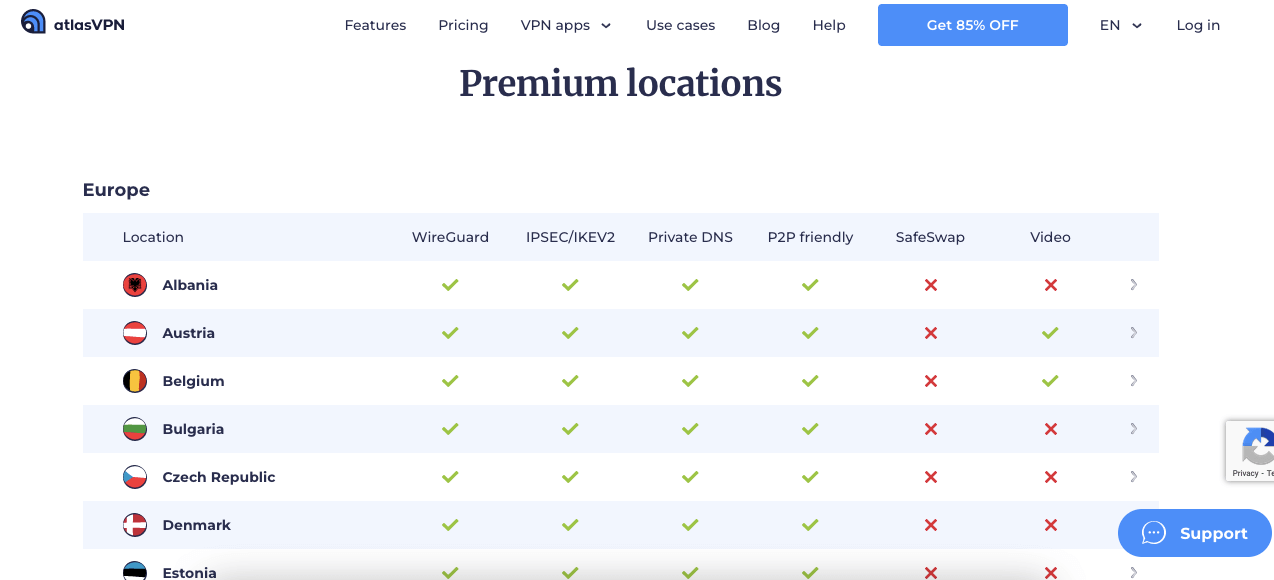
Atlas VPN has a fair number of server locations on six continents, but it’s not a great choice for reaching locales VPNs usually ignore. Just under three-quarters of its locations are in Europe and North America, with South America getting only three locations, Oceania gets two and Africa gets just one. Compare that with Private Internet Access, whose expansive network offers five choices in Africa alone.
How Many Servers Does Atlas VPN Have?
Atlas VPN has 49 server locations in 42 countries. Except for the U.S. and U.K., each country has exactly one location. It’s not clear exactly how many servers there are — the website just says “1,000+,” working out to an average of just over 20 servers per location. Though they aren’t evenly distributed, you still have a good chance of avoiding overcrowding and slowdowns.
Where Are Atlas VPN Servers Located?
Of Atlas VPN’s 49 server locations, 27 are in Europe and a further nine in North America (seven in the U.S. alone). Seven of the remainder are in Asia, though –except for Israel and the UAE — they’re all in the far east. South America gets servers in Argentina, Brazil and Chile. There’s one location each in Australia and New Zealand, and just one in South Africa to cover the whole continent.
The Atlas VPN free version has exactly four servers — two in the United States, one in Singapore and one in the Netherlands.
Speeds & Performance Testing
I used speedtest.net to test Atlas VPN. My process was simple: test my unprotected speed, test my speed on the fastest available server, then keep testing on increasingly distant servers until I got to Australia. I was looking for Atlas VPN to run fast when connected close to home and avoid a sharp dropoff as the distance increased.
It did reasonably well. There were no serious dropoffs to make me think any server wasn’t being maintained — the upside of a relatively small network is consistent attention to each location. However, the results weren’t eye-poppingly great, either. See the table below — you can also see my NordVPN review for some strikingly good speeds.
How Fast Is Atlas VPN?
It’s reasonably fast in all three categories. Download speed was the best category, suggesting that Atlas VPN is good for general browsing and streaming. It may also be a good VPN for torrenting, since upload speeds were also good close to home.
| Location: | Latency (ms) | Download (Mbps) | Upload (Mbps) |
|---|---|---|---|
| 🗁 Portland, U.S. (unprotected) | 16 | 59.61 | 5.83 |
| 🇺🇸 Las Vegas, U.S. (fastest server) | 74 | 55.45 | 5.61 |
| 🇬🇧 London, U.K. | 339 | 44.53 | 5.38 |
| 🇧🇷 Brazil | 398 | 37.19 | 4.12 |
| 🇿🇦 Johannesburg, South Africa | 702 | 27.28 | 4.69 |
| 🇸🇬 Singapore | 371 | 48.56 | 3.74 |
| 🇦🇺 Australia | 305 | 46.21 | 4.80 |
Despite the nearest, fastest server being about 750 miles away from me, I lost only 7% of my download speed, so I can assume it would be even better closer in. Download speed stayed relatively good across the world, only seriously dipping in South Africa (unfortunate, as that’s the only server in Africa).
South Africa also saw latency spike, but other than that, my ping remained under 400 ms worldwide. If you play video games or chat live on servers far outside your home country, Atlas VPN might be a good choice. It’s not great close to home, however, increasing fivefold on the fastest available server.
Streaming & Torrenting
Streaming is where Atlas VPN shines. It can change your IP address while getting around VPN blocks, so you can watch almost any streaming library in any of its locations. The only catch is that those locations are somewhat limited, but 42 countries still provides a lot of content. International download speeds are also good enough for streaming in high-definition.
Can Atlas VPN Unblock Netflix or Other Streaming Sites?
Atlas VPN successfully unblocked Netflix in several countries. It also managed to crack Hulu, Amazon Prime Video and Max. BBC iPlayer also worked on a U.K. server, which is good news for Atlas VPN’s ability to change your streaming region. The only streaming platform I tested that didn’t work was Disney Plus, but that often changes as VPNs renew their IP addresses.
Is Atlas VPN Good for Torrenting?
I urge everyone to use a VPN for torrenting, since internet service providers (ISPs) are still known to employ throttling and cease-and-desist threats now and then. Torrenting clients work on every Atlas VPN server, and speeds are good enough to download large files without being a leech.
Atlas VPN Security: Encryption & Protocols
The first thing I do with any VPN is run a DNS leak test — if a provider can’t hide your IP address, there’s not much point in spending more time with it. Atlas VPN passed the test multiple times on three different servers, proving it can meet the VPN table stakes.

Atlas VPN offers two VPN protocols, WireGuard and IKEv2/IPSec. Both employ AES-256 and other similarly uncrackable encryption algorithms, and both support perfect forward secrecy, which strictly limits the potential damage of any compromised keys. The lack of OpenVPN is disappointing, but WireGuard is getting more trustworthy every day, so I don’t mind too much.
Unfortunately, Atlas has no obfuscation to get around VPN bans, so it’s not a good choice for a China VPN. I recommend VyprVPN instead — see my VyprVPN review to learn why.
How Secure Is Atlas VPN?
Atlas’s security appears to be as strong as I could ask for from any VPN. The only reason it loses points is the zero-day vulnerability discussed in “Is Atlas VPN Safe?”
Two weeks passed between the flaw going public and its being patched. That’s a good response time, but only if it’s not true that Atlas ignored the researcher until he went to the press. Any evidence on that point is hearsay, so I only offer it as a word of caution.
Privacy & Logs
Privacy with Atlas VPN is a mixed bag. On the one hand, I have some strong concerns about its privacy policy, which has never been verified by an audit. On the other, there’s no record of Atlas VPN ever violating its no-logs claims (though it’s only been around for four years). I’ll present the whole story to help you make the call for yourself.
Atlas VPN’s privacy policy takes the form of a long legal document with a short summary of each section. The summaries are insultingly short, but luckily, you’ve got me here to parse the legalese for you.
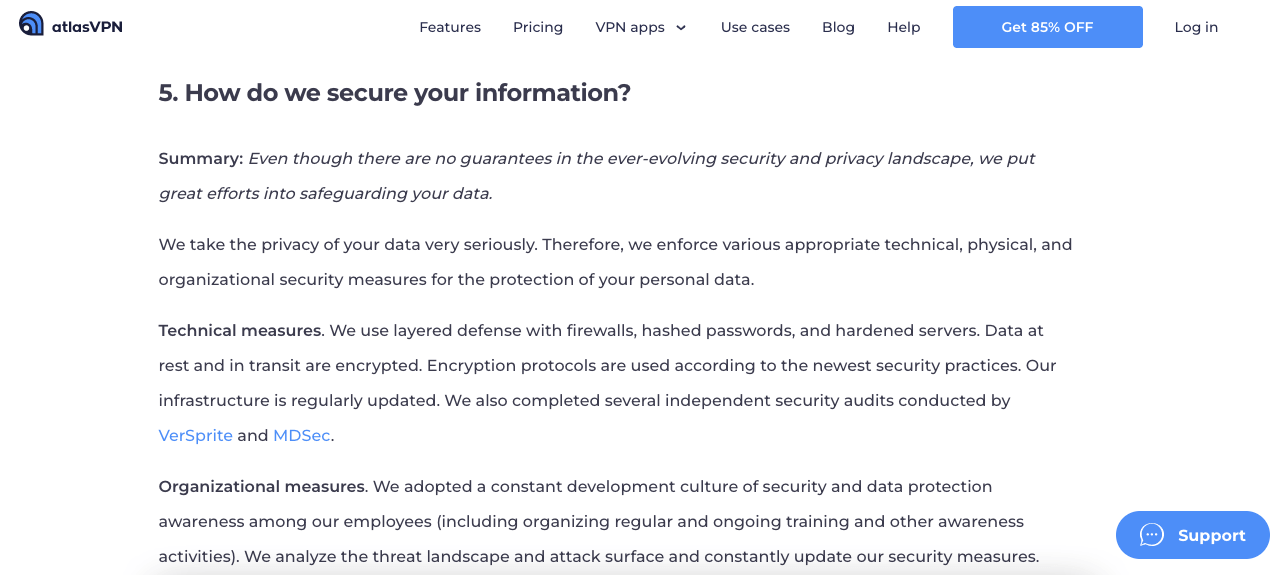
Atlas VPN collects a lot of information on its users, most of which falls within acceptable bounds. However, it will log your IP address in two situations: whenever you use the live chat widget and every time you access the website. It also collects identifying information on mobile devices “for sales attribution purposes.”
The scary part is that there’s no mention of when it deletes that data. A later portion of the privacy policy says that Atlas VPN honors deletion requests, but only for users under laws like GDPR, which guarantee that right. Others may be out of luck.
There’s even more to be worried about in the separate cookie policy, which lists the cookies and trackers Atlas uses on its website. Cookies from Google, Facebook, Twitter and Microsoft — all major culprits in big tech data collection — track users on the site and take at least a year to expire. It’s not clear whether they stick to anonymized information, either.
Does Atlas VPN Keep Logs?
There is no proof that Atlas VPN doesn’t honor its no-logs policy, but I wish there was more proof that it did. The burden of evidence should be on the VPN. Atlas has completed audits of its security infrastructure, but none of its privacy policy.
This is all circumstantial evidence, as I’ve yet to see Atlas caught up in a logging scandal like what happened to IPVanish. However, plenty of VPNs, like privacy leader Mullvad (see my Mullvad review) have figured out how to get by without storing any user information at all, so Atlas has no excuse for lagging behind.
Customer Support & Service
Atlas VPN’s website has a help center divided into five topics, each subdivided into several articles. These articles are themselves broken down into sections for each operating system, so you almost always have to click your way three or more levels deep to find any answers. Once you get past the convoluted organization, though, information is usually clear and helpful.
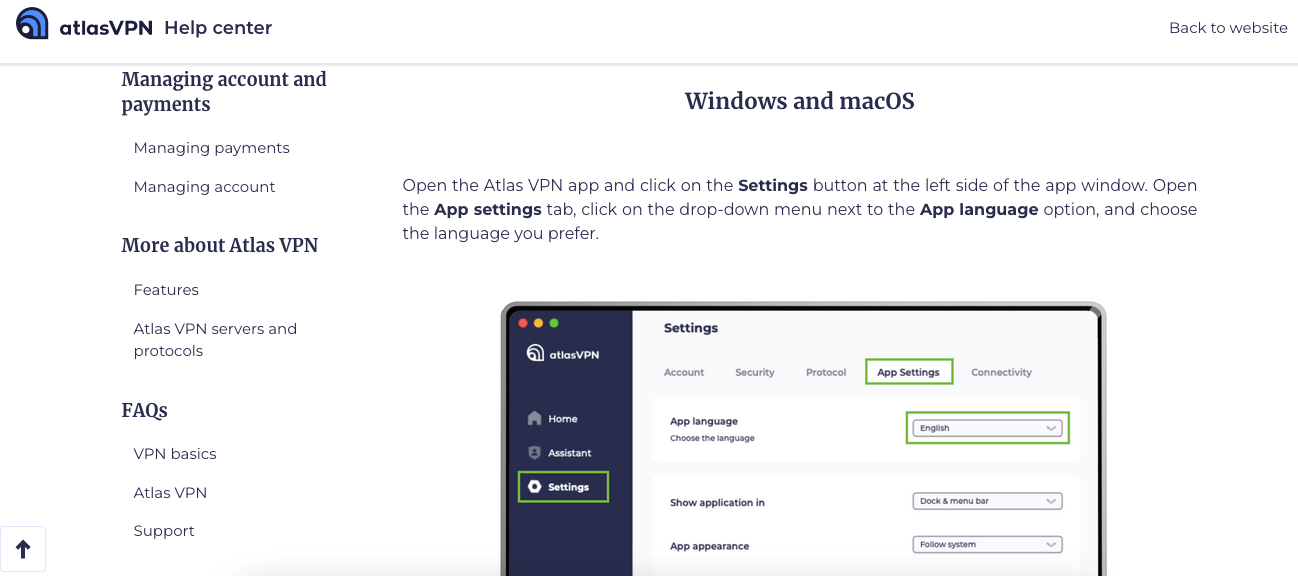
requires wading through a help center labyrinth.
To the help center’s credit, there’s a search bar on the front page that works perfectly well. If you can’t find your answer amid the maze, or just don’t want to, there are two other options for getting support: live chat and email. However, live chat is only available to paid users.
How to Contact Atlas VPN
There appear to be links to both live chat and email at the bottom of the front page of the knowledgebase, but these just take you to a help page. To actually get help, log in to your paid account and click the support button that appears in the website’s bottom-right corner. If you don’t have a paid account, you’ll need to submit an email ticket through this request form.
Ease of Use
Atlas VPN doesn’t have a ton going on, but it does a great job organizing what features there are. While using the app, I never had trouble finding a certain switch or the specific server I needed. Everything is pleasing to look at and (mostly) works the first time you use it.
I tripped up only twice. The first time was when I tried to activate SafeBrowse, the feature that blocks trackers and malware. It doesn’t work unless the VPN is active, so I connected to a server before turning SafeBrowse on. No good — if you turn on SafeBrowse while already connected to the VPN, you have to disconnect and reconnect.
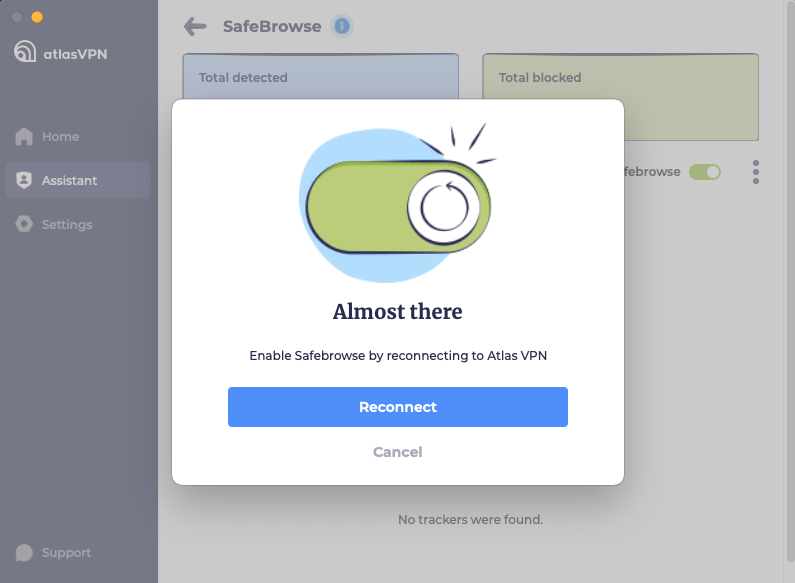
The second problem is that the kill switch is active by default, and it is a bit hair-trigger. It treats any disconnect as a VPN connection fault, even a manual one, and cuts off your internet. If you don’t think to look in the settings, you may find that your internet is inexplicably broken, even with full WiFi bars.
These slip-ups feel noticeable only when compared to the utterly smooth experience of a service like NordVPN (see my NordVPN review). Atlas VPN should feel perfectly comfortable for VPN novices. For anything not self-explanatory, the VPN client comes with helpful informational blurbs.
Bottom Line: Do I Recommend Atlas VPN?
In one specific situation, I recommend Atlas VPN wholeheartedly: it’s the best free VPN I’ve found that offers unlimited simultaneous connections. If you need to get a whole room full of people on a VPN very quickly, it could do the trick.
With that said, there’s not much point to unlimited connections on a free VPN. Everyone can make their own free account just as easily. The free plan also limits traffic to 5GB, which won’t be enough for a lot of streaming. Given the limited use case atop its other flaws, I’m hesitant to give my full-throated endorsement.
Atlas VPN had the bad luck of sitting next to NordVPN and Surfshark, two VPNs that outshine it in almost every way. However, even without those two comparison points, I think I would have been underwhelmed. VPN providers are a crowded field these days, and “pretty good” just doesn’t cut it anymore.
Have you used Atlas VPN? Do you agree with my take, or have an objection to raise? Let me know in the comments. Thanks for reading, and I’ll see you for the next review!
Atlas VPN Alternatives
NordVPN, one of the other two VPN providers owned by Atlas’s parent company, is faster, more secure and way richer in features than most other VPNs. Get the whole list in my NordVPN review.
Surfshark is Atlas’s other sibling VPN. It’s recently expanded into a security suite, Surfshark One, which adds several exciting new apps for anonymity. My Surfshark review has the story.
ExpressVPN is a lot more expensive, but comes with the good balance of usability, speed and a wide server network. See my ExpressVPN review for the whole story.


Leave a Reply